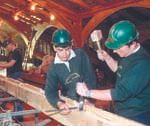Specialist building industry in turmoil
Many specialist building companies are facing collapse, threatening the skill sets behind a crucial niche industry


There is turmoil in the specialist building industry, with the difficulties faced by a significant number of companies ringing alarm bells in the heritage sector. The largest casualty is the Linford Group of Lichfield, which has gone into liquidation, taking with it its smaller sub-companies of Dorothea Restoration (metalwork) and Trumpers (historic plasterwork). Stonewest, which produced exquisite work at St Pancras, went into administration in September, but has been acquired, with all 128 employees, by a new company.
But the 61 employees of its group companies Rattee & Kett of Cambridge, which have been long associated with Westminster Abbey, and St Blaise, which worked at Uppark, have been laid off. Holloway White Allom, the construction company behind the Old Bailey, Chelsea Bridge and the Trafalgar Square fountains, has gone into administration with the loss of 175 jobs. George Jackson & Sons, plasterers founded in 1780 and holding one of the most significant collections of moulds, went into administration, but was due to be rescued last week and will be renamed George Jackson Ltd.
The situation resonates with Rory Cullen, the National Trust's head of building, who has recently seen two companies go bust halfway through projects. ‘It's worrying because there seems to be a rash of it, and they're good companies,' he says. ‘I suspect some have been caught out by bad debts with large private owners.'
‘I don't remember it being so suddenly catastrophic,' comments Philip Venning, secretary of the Society for the Protection of Ancient Buildings (SPAB). ‘The most alarming thing is that we don't know what precipitated it. Linford is the most surprising news of all, and it's a great pity because it did so much to promote training.'
Ian Dungavell, director of the Victorian Society, agrees the implications are serious. ‘We need someone to arrive on a white charger, or we will end up with a seriously de-skilled building industry,' he explains. ‘People at top-end firms such as Stonewest can do work every bit as good as the originals. We will lose the expertise and the records, and people who need restoration work done won't know where to go. If it were a major painting being sold, the public would rally round, yet some of these companies are just as important historically.'
Ian Morrison, head of historic-environment conservation at the Heritage Lottery Fund, has received anecdotal evidence that suggests a significant number of specialist construction firms are running into trouble. ‘As the principal funder of heritage in the UK, we are very worried about the impact of the loss of expertise on our grant-aided projects,' he says. ‘All the major historic-environment organisations in the UK need to have an urgent dialogue to see if there are practical steps we can take. As the private sector is by far the major source of new orders for such work, events are, to a certain extent, beyond the control of the heritage bodies.'
Repair, don't replace
Sign up for the Country Life Newsletter
Exquisite houses, the beauty of Nature, and how to get the most from your life, straight to your inbox.
SPAB's annual National Maintenance Week, in which homeowners and those who care for public buildings are encouraged to do precautionary maintenance work, takes place this month (November 18-25), led by Jonathan Foyle, chief executive of the World Monuments Fund. ‘Over the past half-century, maintenance has become a dirty word, and it shouldn't have,' he says. ‘We live in an increasingly throwaway world, so one of the key questions SPAB will ask this year is what can I repair, not replace?' For advice, telephone 020-7377 1644 or visit www.spab.org.uk l The Victorian Society's travelling exhibition, which celebrates its first 50 years, has opened at Leeds City Museum (until December 23). Curated by Gavin Stamp, it highlights the society's leading campaigns, such as for St Pancras station, and includes material from the society's first meetings with the likes of Sir John Betjeman and Nikolaus Pevsner.
Country Life is unlike any other magazine: the only glossy weekly on the newsstand and the only magazine that has been guest-edited by HRH The King not once, but twice. It is a celebration of modern rural life and all its diverse joys and pleasures — that was first published in Queen Victoria's Diamond Jubilee year. Our eclectic mixture of witty and informative content — from the most up-to-date property news and commentary and a coveted glimpse inside some of the UK's best houses and gardens, to gardening, the arts and interior design, written by experts in their field — still cannot be found in print or online, anywhere else.
-
 A well-connected rural playground with 23 acres on the edge of the South Downs National Park
A well-connected rural playground with 23 acres on the edge of the South Downs National ParkOld House Farm is an impressive family home with a wealth of amenities that would inspire any rural passion.
By Arabella Youens Published
-
 The UK gets its first ‘European stork village’ — and it's in West Sussex
The UK gets its first ‘European stork village’ — and it's in West SussexAlthough the mortality rate among white storks can be up to 90%, the future looks rosy for breeding pairs in southern England.
By Rosie Paterson Published
